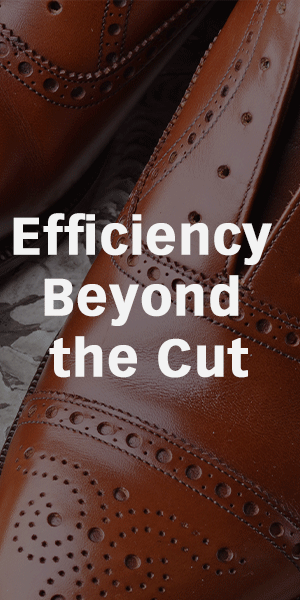To repair is to care

A lowering of tax on shoe repairs in France should convince more consumers of the benefits of renewing and reusing footwear as part of a more sustainable economic model.
Anational organisation representing shoe repair service providers across France, the Fédération Française de la Cordonnerie Multiservice (FFCM), has welcomed a tax change. Towards the end of 2024, France’s lower house of parliament, the Assemblée Nationale, voted in favour of lowering the rate of value-added tax (VAT) for repairs of shoes and leathergoods from 20% to 5.5%.
FFCM says this lower rate of VAT represents “true recognition of the key role that our artisans play in the preservation of our savoir-faire, and in the transition towards a more sustainable economic model”. There are more than 180 footwear repair specialists from all parts of France in FFCM’s membership. The organisation says it is taking encouragement from a change in consumer attitudes in recent years. It says consumers have become “more sensitive to environmental challenges” and are beginning to express a preference for products that are long-lasting and repairable. “Repair and, as a consequence, the shoe repair profession, are showing themselves as good alternatives to over-consumption,” FFCM insists.
It celebrated a campaign that umbrella organisation Alliance France Cuir launched towards the end of 2024. This campaign highlighted the appeal that artisan skills and savoir-faire have for contemporary consumers. This appeal, FFCM says, is born of a desire among the people of today for quality and authenticity, and it says shoemakers and shoe repair experts have skills that can help people satisfy this desire. Their skills ought to stand them in good stead for years to come, the organisation argues.
Public service
One expert who aims to remain in shoe repair for the long haul is Marie-Élodie Chadaillac, who runs her own shop, Cordonnerie Sept Lieues, in Agen in south-west France. Sept Lieues means ‘seven leagues’, a reference to the seven-league boots made famous by collector of folklore and fairy-tales Charles Perrault.
Ms Chadaillac worked in the finance department of luxury brand Chanel for 13 years before branching out on her own, turning a passionate commitment to product durability and zero-waste into her daily work. She has told FFCM that she loves the interaction with customers who come into the shop, bringing shoes of all kinds, including athletic shoes, boots (she doesn’t say if any seven-league boots have turned up yet) and leathergoods. She spends time with the owner of each product, sharing suggestions for allowing these objects to keep looking their best.
A further piece of advice that she has shared with FFCM is that women interested in this line of work should never be put off by the physical demands. Patience, the ability to think and pay close attention to detail are the key attributes that she identifies as important for a shoe-repair artisan. Physical strength is secondary, she says, for a job that she views as “a bridge between the old and the new”.
Logical progression
Elsewhere in France, repair services are a new venture for 2025 at the high-end shoe brand that Philippe Zorzetto founded and runs. He made the announcement in January, pointing out that the decision flies in the face of advice that those closest to him have been keen to offer. “They have warned that this will mean selling fewer new shoes,” he says, “and that it won’t be financially viable because customers are used to the throwaway culture. Well, I think the exact opposite.”
He argues that offering to repair the shoes his customers buy is “a logical progression”. It is a progression that has taken some time. Philippe Zorzetto marked out his path into footwear as a child, listening to the tales of his grandfather, a shoe manufacturer from Veneto in northern Italy, who brought his dreams of setting up his own footwear brand to France. This was a dream that he was unable to fulfil directly, but his grandson made it come true, opening his workshop and boutique in the Parisian district of Le Marais in 2009.
“Creating my own footwear brand brings together everything that I love and everything that motivates me,” he says now. “That includes fashion, of course, but also influences from films and pop culture, as well as a love of vintage, of craftsmanship and of beautiful materials.” Nevertheless, it was a big step for him because, he says, when he decided to enter the industry he knew no one in the fashion world, had no contacts among footwear manufacturers, no business partner and no money.
New materials
His father, a carpenter, had helped instil in the young Philippe Zorzetto a passion for drawing and, inspired by his grandfather, he found himself frequently drawing shoes. Sketches of an inaugural collection, boots, brogues and moccasins, were his starting point. Armed with his drawings and with a last that had belonged to his grandfather, he set out to build ties with a number of family-run, artisan shoe manufacturers in Spain and Italy. He spent time in their workshops and learned from them how to choose and cut leather, and how to construct a shoe from the pieces. These artisans also taught him the Blake construction method of using a chain stitch to attach the insole to the outer sole of the shoe.
In this way, that first collection became reality and a run-down workshop he chanced upon in Le Marais became the showcase for it (after his father had used his skill to carry out some repairs to the building). The business has grown from there and now numbers singer Matthieu Chedid and actors Jean Dujardin and Romain Duris among its regular customers. The designer says he is proud still to be working with a number of the family-run manufacturing companies that taught him.
He reports no protests from these manufacturing partners over his decision to start providing repair services, too. Blake construction makes it possible to unstitch the insole from the outer sole and to resew with new materials as required. He makes the point again that this is a logical step to take, referring to it as a gesture of respect for customers, a move that is in keeping with his own values and “an obvious thing to do”.
The authorities in France are supporting footwear repair by lowering the value-added tax that service providers have to apply.
Credit: Shutterstock












